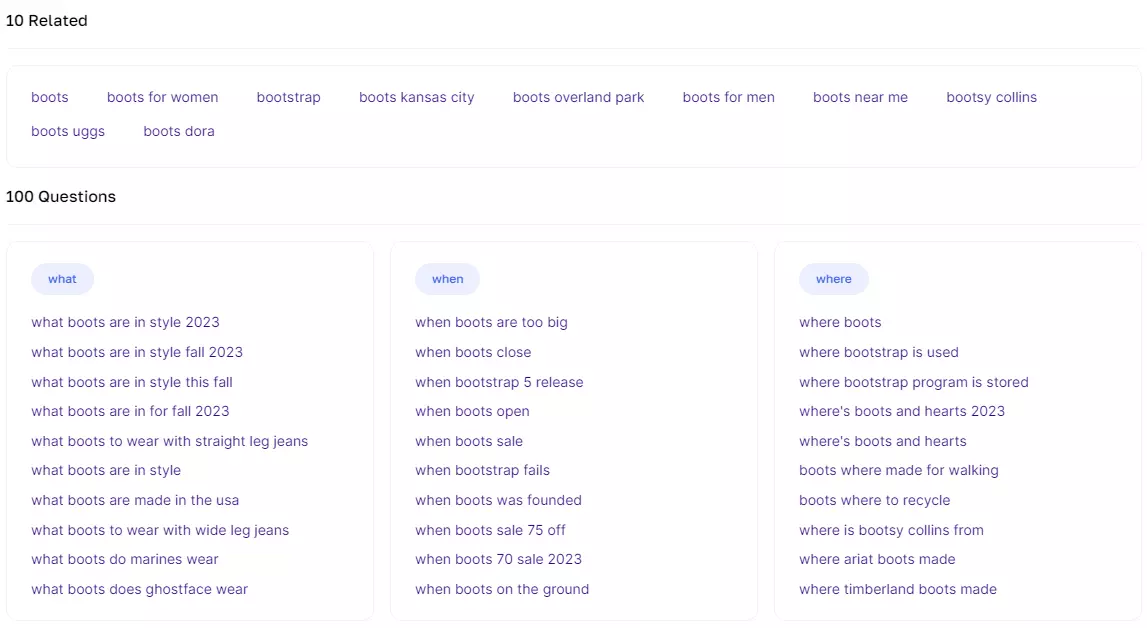
When it comes to marketing your products, you've likely encountered the adage, "The more pertinent the keyword is to your product, the simpler it becomes for users to discover it." However, what are seed keywords exactly?
Seed keywords are the core terms or phrases that represent the primary topic or theme of a website, product, or service.
In this post, we'll delve into the world of seed keywords, exploring their definition, importance, implementation strategies, and their pivotal role in enhancing website rankings and organic traffic.
What Are Seed Keywords?
Wondering what is a seed keyword? A seed keyword is a short-tail keyword, usually with one or two words.
Similar to other short-tail keywords, seed keywords often exhibit high monthly search volumes and face significant competition. Unlike other short-tail keywords that might include modifiers, seed keywords inherently lack modifiers.
These seed keywords serve as the foundational elements that initiate the growth of other related keywords, which can be utilized to optimize website content.
Once you've identified pertinent seed keywords for your website, you can expand upon them by adding modifiers to create longer and more specific long-tail keywords.
If you run an online store selling boots, your seed keywords can be “boots,” or “woman boots". Niche Finder’s Keywords Generate can generate hundreds of related keywords containing these seed keywords:

Why Are Seed Keywords Important in SEO?
Here are some benefits of seed keywords for SEO.
1. Foundation of Keyword Research: Seed keywords lay the groundwork for comprehensive keyword research. They act as a springboard to uncover related long-tail keywords, enabling marketers to identify user intent and preferences.
2. Targeting Audience Intent: By understanding user intent behind seed keywords, businesses can align their content strategies to meet the needs and preferences of their target audience. This alignment significantly improves engagement and conversion rates.
3. Content Creation and Optimization: Seed keywords drive content creation by providing a framework for structuring website content. They aid in optimizing website pages, meta tags, and headings to enhance search engine rankings.
4. Competitor Analysis: Seed keywords are pivotal in analyzing competitors' strategies. By identifying which keywords competitors are targeting, businesses can fine-tune their SEO strategies to gain a competitive edge.
You can use Website Audit to conduct a thorough competitor analysis, just entering their domain name, you can collect comprehensive data on your competitors:

How to Find Seed Keywords? 6 Tips
Discovering seed keywords encompasses various approaches, leveraging available resources within search engines and exploring head terms utilized by competitors.
Below, I'll elucidate the most efficient methods to identify seed keywords for your SEO strategy.
1. Generate Seed Keyword Ideas From Your Main Topic
Initiate your quest for seed keywords by brainstorming the primary topics associated with your business. Begin by outlining the most popular broad-level keywords that showcase your business to your audience.
This method offers a starting point, bypassing the overwhelm of analyzing competitor sites or auditing prevalent posts, which we'll explore later.
2. Find Your Competitor’s Keywords
Examining your competitors' websites stands as a pivotal aspect of keyword research.
As your aim aligns with ranking for similar queries as your competitors, your seed keywords are likely to overlap with theirs.
Read More: What is Keyword Difficulty in SEO?
3. Look in Google Search Console
Use Google Search Console (GSC) to unearth critical search queries. Within GSC, navigate to Performance > Search Results on the left panel.
In the Queries tab on the right, you'll discover keywords for which your content already ranks. Utilize this information as a springboard for additional seed keywords.
4. Use information in Google’s SERPs
SERPs remain an endless source of fresh keyword ideas, lacking vital details like search volume and traffic insights.
Fortunately, several SEO tools offer this information, with the Keyword Surfer Chrome extension standing out as a free option, boasting a stellar 4.5-star rating from over 400,000 users.
5. Review Forum Chats, Comments, and Posts
Engage with websites where your audience congregates to understand their sentiments, inquiries, and interests. A blog review, a forum thread, or a support forum query can all yield valuable seed keywords.
These platforms showcase user comments elucidating concerns and interests, serving as your target audience—insights crucial for winning them over.
6. Talk to Sales and Support teams
Direct conversations with customers and customer-facing teams offer invaluable insights. Communicate with sales representatives and customer support personnel to grasp the terms and phrases used when discussing challenges your product resolves.
Employ these insights as seed keywords to craft tailored content that resonates better with your audience.
Final Words on What Are Seed Keywords
Seed keywords are the cornerstone of effective SEO strategies. They form the basis for comprehensive keyword research, content creation, and audience targeting.
By understanding their importance and implementing them strategically, businesses and individuals can significantly enhance their online visibility, attract targeted traffic, and achieve sustainable growth in the competitive digital landscape.
In essence, the power of seed keywords lies not only in their simplicity but in their ability to unlock the vast potential of SEO, enabling businesses and individuals to thrive in the ever-evolving online realm.
Read More: How to Find Low Difficulty Keywords?

